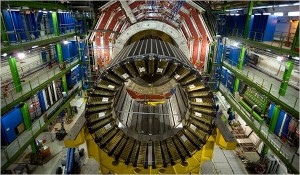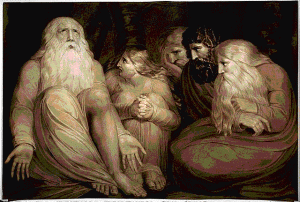For the past 50 years or so, scientists have been looking for the elusive “Higgs boson” particle (named after physicist Peter Higgs, who postulated the existence of this particle). The confirmation of the particle’s existence would complete the “Standard Picture” of the subatomic building blocks of the universe. The uniqueness of the Higgs boson is that it appears to bequeath mass to other particles, who — sadly — have no mass. Thus, the particle is thought to be responsible for the emergence of matter which has become our present universe. No mass, no matter. No matter, no life.
Higgs did the math to show that how the particle would behave and what it would ‘act like.’ But that was all on paper; in the meantime, the little bugger has eluded empirical discovery. It was so elusive, that a physicist originally coined it the “Goddamn particle,” in a proposed title to his book on the subject. His publisher persuaded him to re-name it “The God Particle,” and the name has taken off in the public sphere (much to the chagrin of many physicists).
The installation of the Large Hadron Collider, a massive underground particle accelerator in Switzerland which attempts to re-create the conditions immediately after the Big Bang, has (apparently) set the stage for the actual discovery of the particle,

matching the theory to the “real thing” (as “real” as the quantum world allows). It should be noted, though, that scientists are as yet unwilling to confirm that the particle is, in fact, the exact one Higgs predicted (though confirmation is expected).
This is fascinating stuff. The “Standard Theory” is seemingly confirmed as the fundamental theory behind the physics of the natural world and behind the cosmos’s emergence. I’m no scientist, but I have great admiration for those who dedicate their lives to discovering the building blocks of the physical world (seen and unseen, atomic and subatomic, the world of plants and planets and quarks, gluons and bosons).
But it equally fascinates me to realize that in another 50 or 100 years (let’s say), the Standard Theory will likely be remarkably outdated. There will be corrections, amendations, and alternations. There will possibly be a very different “Standard Theory.” The anomalies in the world, which do not fit the theory, will have piled up to the point that the pressure will be on to either figure out how they fit into the theory or to revisit the theory altogether. Read Thomas Kuhn’s Structure of Scientific Revolutions, if you don’t believe me. In the ancient world, the basic building blocks of the universe were fire, earth, air and water. Now they are the twelve particles of matter (six quarks, six leptons) and the four forces of nature (and of course the Higgs boson).

This should not depress us. Rather, it should remind us that not only is God mysterious beyond our imagining, but so is the creation he brought into existence. “The heavens declare the glory of God, the skies proclaim the work of his hands” (Psalm 19:1). Scripture tells us that, not only is the natural world magnificent, but human beings are unique in that creation (Psalm 8). Among all their capacities, is a persistent curiosity regarding the world in which we live. Humans live in a state of “openness to the world” (Pannenberg) which drives our desire to know it. I wonder, at a time like this, if God doesn’t find us human beings especially endearing? And yet, perhaps he cannot help but chuckle (forgiven the anthropomorphism here), knowing that we have yet so much more to learn and to discover. Remember God’s word to Job?
“Where were you when I laid the earth’s foundation? 
Tell me, if you understand.
5 Who marked off its dimensions? Surely you know!
Who stretched a measuring line across it?
6 On what were its footings set,
or who laid its cornerstone —
7 while the morning stars sang together
and all the angels[a] shouted for joy? (Job 38:4-7)
IIt’s quite remarkable that scientists have quite possibly discovered the elusive “Goddamn particle.” Even so, much yet lies beyond the grasp of human knowledge and understanding. Discovery, exciting and profound it can be, often opens up new pathways of mystery that call out for further exploration. These new pathways will prove equally–or more–elusive. If God’s world is beyond our ability to master (try as we might), how much more is God?











